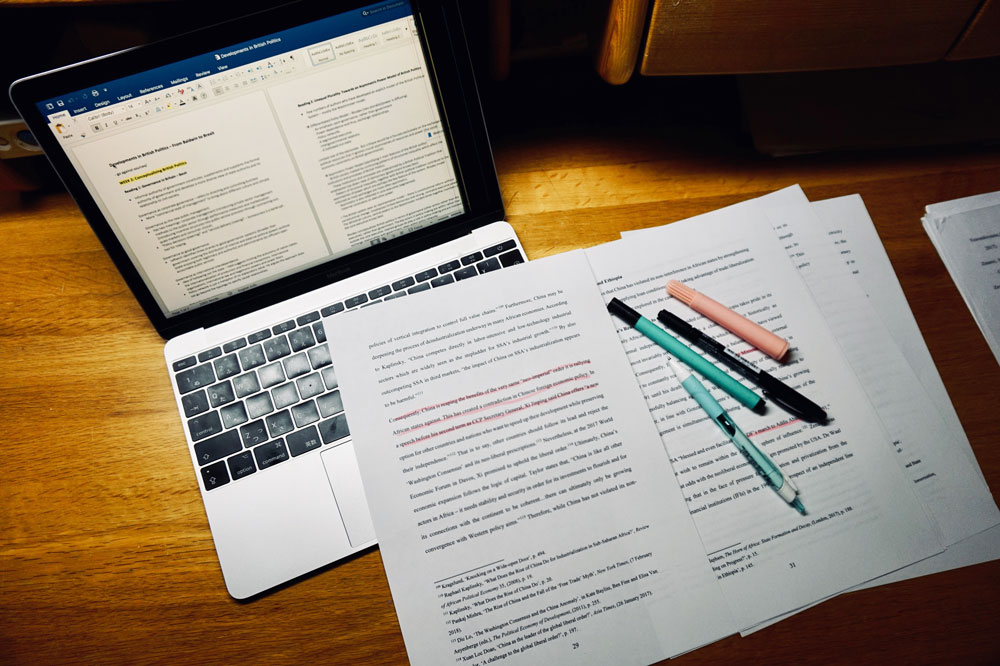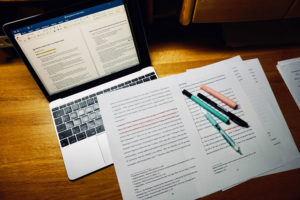Through the midst of Christmas and New Year celebrations, perhaps some of you try to avoid the question “how is revision going?” Yet, exams are right around the corner, so I hope to help at least some of you out there who are struggling to revise and probably googling the least amount of marks you have to attain to pass the year.
Before I came to University of Exeter, I personally took a long time to figure out what revision techniques suited me best. In school, my teachers would always say “revise how you study best.” Some of my friends would study in groups, use flash cards or even say their thoughts out loud. It took me a while ’till I figured what revision methods work best for me. Below is some advice I hope you can implement to your revision.
I cannot highlight enough the importance to check the content that will be in your exam and plan your revision accordingly. A mistake I have learnt in the past is to be careful not to mix your stage of revision planning with the time you are supposed to be revising. Planning when and what to revise takes a while to plan, hence make sure you do this before actually starting to revise. For example, if you know you have covered 11 weeks of chapters in Term 1, then you know all those chapters will probably be in the exam. Or, if your lecturer has told you which specific weeks will be in the exam, then make sure you only revise those weeks of content to avoid wasting time. Writing a checklist also helps to not only make it clear what you need to revise, but also make you feel better (when ticked off) on how much progress you have made after revising. Just make sure you plan first before you revise so you don’t be ineffective by planning when you are supposed to be revising.
-
Make sure to check all available resources given to you by the lecturer for revision
If your lecturer has carried out a revision lecture, remember what he/she said that may be important in your exams. The lecturer may give you resources to help you in your revision, such as providing past papers. Personally, looking at past questions provided to me by the lecturer helped me greatly as I could see how the questions were worded and time myself when writing down the answers to them. My friend Evelyn who studies Medical Sciences said, “do practice papers provided to you multiple times, especially if there are multiple choice questions included, as they often come up again.” Hence, always check the resources provided for you and try to incorporate them as much as you can into your revision.
-
Get rid of distractions
Having an easily distracted personality, I often found it hard to not look at my phone or play on my laptop when revising. It is important to put away any distractions so you can purely focus on revision. My friend Catia recommends using the ‘Self Control’ or ‘Cold Turkey’ apps, which block websites you list onto the app for however long you set the timer.
-
It’s hard to get started, but once you do, revision will be easier
I always associate revising like writing an essay. Starting to revise is difficult, similar to how writing an introduction for an essay (to me anyway) is the most difficult part. Yet, once you stop procrastinating and get going, revision becomes much easier. After the preparation stage, I have learnt that the most effective way of revising personally, is to keep writing down in specific detail content that may come up in my exam. Although this sounds repetitive, writing information down on paper will help you remember, especially when most students write their notes down on their laptops during the term.
There are some things to be careful of when starting revision:
- Although I made a revision schedule, it is highly unlikely that it will go accordingly to plan. I had days when my family would unexpectedly go out for lunch etc. Thus, make sure you leave plenty of time to catch-up on things that you may miss or may take longer than scheduled.
- If you are using flash-cards, make sure you have made the flash cards before starting to revise. Linked to the point above about effectively using revision time, do not make your flash cards during revision. If it’s too much of a hassle, apps such as ‘Studyblue’ helps you to make flashcards on your device, making the process much easier. Note you can also use YouTube videos or online mini quizzes and much more!
- Although it is important to take breaks so your brain can rest and you can go and do the things you like, I recommend that once you start revising on your “chunk” of the day, don’t be too bothered by looking at the clock. Personally, what I found best was to not look at the clock and countdown how many minutes I had left till my break and rather focus on what I needed to get done at the time, so I can go and do other things later.
If you`re like me and can`t help but to procrastinate so you start looking at quotes on Instagram hoping a motivational quote will inspire you to revise, you may have heard the quote “work smarter, not harder.” Personally, I find this quote so relatable. You can revise for hours and hours and not get anything effectively done if you are not revising efficiently. By learning how to work smarter, you spend less time stressing and thinking “I have to revise more,” as you would gain knowledge on how to use revision time in the most effective way possible to you.
-
Eat Well and Drink Water
Although a common tip when revising, these two-basic advices can make your revision more effective. Going back to the quote “work smarter, not harder,” it is important to drink water so you can remember what you have learnt throughout the day. Although I’m not a scientist, I know that the water is needed in order for the brain and body to function effectively. During exam time, I try to drink more water and less coffee, in order to keep me hydrated at all times. Likewise, eating well is equally important, yet I realize there is temptation to order some fast food. It is important to eat a balanced diet. If snacking, try to eat dark chocolate or fruit (my favourite is blueberries). Making small changes such as having a balanced meal may make all the difference when taking your exam.
A brief summary on the revision methods I found most effective studying International Relations
Although the methods I use to revise will not be effective for all, I thought I would highlight what I find effective and how I found the best way to revise personally.
I often revise in the library in the silent room as I study best alone with some classical music and of course, snacks. For myself, I find the most efficient way to revise is to write things down. For example, say I was learning about Climate Change which was covered in one of the weeks of term, I would start with looking over my lecture and seminar notes. Although this may sound ineffective, I believe it is important to learn the definitions of the key-terms that come-up within that week. After I write down the definitions repetitively, I then look out for the key debates surrounding the issue of climate change. These debates often (in IR) are what the exam questions are based on. It is important to grasp not only the debate surrounding the content but also the counter-argument. By writing down summaries of the key debates around e.g. Climate Change and examples, I gained wider knowledge of the issues which may come up in the exam. Lastly, I looked over past questions to practice not only what I had just learnt, but also to get used to writing essays when under time pressure.
GOOD LUCK!
I wish you all good luck in your exams. Make sure at the night before your exam that you have your student ID card and multiple pens and pencils, or a calculator if needed. Preparing your bags for the next day will make all the difference and save valuable time in the morning so you can be on time for your exam. – Kona


